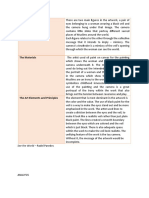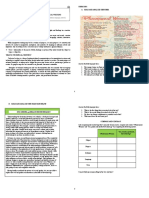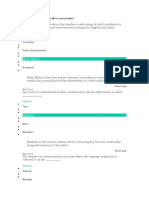0 ratings0% found this document useful (0 votes)
416 views(Interpretation) Apo On The Wall by BJ Patino
(Interpretation) Apo On The Wall by BJ Patino
Uploaded by
Tina ManforteThis poem depicts life under martial law in the Philippines from the perspective of a young boy. The boy feels fearful around his strict father who works for the government and has brought home a photo of President Ferdinand Marcos, referred to as "Apo." The boy senses Apo is watching him like a "scary Jesus" and feels his every move is being monitored. The last line conveys the boy's fear that Apo knows what he is doing, regulating his behavior and signifying the oppressive atmosphere of martial law.
Copyright:
© All Rights Reserved
Available Formats
Download as DOCX, PDF, TXT or read online from Scribd
(Interpretation) Apo On The Wall by BJ Patino
(Interpretation) Apo On The Wall by BJ Patino
Uploaded by
Tina Manforte0 ratings0% found this document useful (0 votes)
416 views3 pagesThis poem depicts life under martial law in the Philippines from the perspective of a young boy. The boy feels fearful around his strict father who works for the government and has brought home a photo of President Ferdinand Marcos, referred to as "Apo." The boy senses Apo is watching him like a "scary Jesus" and feels his every move is being monitored. The last line conveys the boy's fear that Apo knows what he is doing, regulating his behavior and signifying the oppressive atmosphere of martial law.
Original Description:
Story and information in 21st century
Original Title
Apo
Copyright
© © All Rights Reserved
Available Formats
DOCX, PDF, TXT or read online from Scribd
Share this document
Did you find this document useful?
Is this content inappropriate?
This poem depicts life under martial law in the Philippines from the perspective of a young boy. The boy feels fearful around his strict father who works for the government and has brought home a photo of President Ferdinand Marcos, referred to as "Apo." The boy senses Apo is watching him like a "scary Jesus" and feels his every move is being monitored. The last line conveys the boy's fear that Apo knows what he is doing, regulating his behavior and signifying the oppressive atmosphere of martial law.
Copyright:
© All Rights Reserved
Available Formats
Download as DOCX, PDF, TXT or read online from Scribd
Download as docx, pdf, or txt
0 ratings0% found this document useful (0 votes)
416 views3 pages(Interpretation) Apo On The Wall by BJ Patino
(Interpretation) Apo On The Wall by BJ Patino
Uploaded by
Tina ManforteThis poem depicts life under martial law in the Philippines from the perspective of a young boy. The boy feels fearful around his strict father who works for the government and has brought home a photo of President Ferdinand Marcos, referred to as "Apo." The boy senses Apo is watching him like a "scary Jesus" and feels his every move is being monitored. The last line conveys the boy's fear that Apo knows what he is doing, regulating his behavior and signifying the oppressive atmosphere of martial law.
Copyright:
© All Rights Reserved
Available Formats
Download as DOCX, PDF, TXT or read online from Scribd
Download as docx, pdf, or txt
You are on page 1of 3
21ST CENTURY LITERATURE
[ I N T E R P R E TAT I O N ] A P O O N T H E
WA L L BY B J PAT I N O
BY TEACHERDEL - JANUARY 29, 2019
1. There's this man's photo on the wall
2. of my father's office at home, you
3. know, where father brings his work,
4. where he doesn't look strange
5. still wearing his green uniform
6. and colored breast plates, where,
7. to prove that he works hard, he
8. also brought a photo of his boss
9. whom he calls Apo, so Apo could,
10. you know, hang around on the wall
11. behind him and look over his shoulders
12. to make sure he's snappy and all.
13. Father snapped at me once, caught me
14. sneaking around his office at home
15. looking at the stuff on his wall - handguns,
16. plaques, sword, medals, a rifle-
17. told me that was no place for a boy,
18. only men, when he didn't really
19. have to tell me because you know,
20. that photo of Apo on the wall was already
21. looking at me while I moved around,
22. his eyes following me like he was
23. that scary Jesus in the hallway, saying
24. I know, I know what you're doing.
1. How would you describe the persona and the persona's father? How
would you describe their relationship?
The persona is a boy, innocent, scared, yet, is curious.
The persona's father is strong, strict, obedient (to his commander).
As we look thought the monologue of the child, we can feel that his
relationship with his father is distant. It is surrounded by fear of being
snapped at or scolded upon. We can also sense in line 17 that the father
does not show much loving affection to his son, but just a disturbance
to his office.
2. Who is Apo in the poem? Cite evidence to support your answer.
Apo is Ferdinand E. Marcos. Apo in Ilocano language means, "sir" or
"master". It is also an endearment term for the elderly.
Marcos was born in Ilocos Norte. Ilocanos take pride in calling
Ferdinand Marcos "Apo". He is a superhero, an Ilocano pride.
In the poem, we can claim that the "Apo" that was mentioned is
Ferdinand Marcos. A line states "so Apo could, you know, hang around
the wall". It has been an SOP that in government offices the portrait of
the President shall be hanged on the wall.
In addition, this poem portrays a situation during Martial Law.
3. Why is Apo compared to "scary" Jesus in the hallway? What do they
seem to have in common?
In Christian Religion, Jesus has been described as omnipresent. He
knows just about everything and anything whether it is an overt or
covert action.
The child sees Apo as a figure like Jesus that whatever he does, it will
be seen by Apo. This can be seen in the line "Apo on the wall was already
looking at me while I moved around".
Yet, unlike Jesus, the child adds the adjective "scary", to show his fear
with Apo.
4. What does the last line mean? How does this regulate the persona's
behavior?
"I know, I know what you're doing"
This intensifies the portrayal of fear of the child to Apo, that even in a
photo, he feels the presence of Apo and anything he does may become
something for him to be sent in trouble.
5. How does this poem provide the reader of what martial law was like?
Martial law is depicted as something horrific that even in an innocent
eyes of a child, fears strikes his every move. That even a lifeless picture
can send chills down a child's spine.
How much more to those who knows exactly what's happening
outside the premises of their homes
You might also like
- MyCredit System PDFDocument18 pagesMyCredit System PDFRakeem Addison100% (1)
- 10 Uncommonly Use Filipino WordsDocument3 pages10 Uncommonly Use Filipino WordsAnonymous 5MIxmqlJvxNo ratings yet
- David, Diana Joie B. 12-ABM B ApplicationDocument2 pagesDavid, Diana Joie B. 12-ABM B ApplicationDiana Joie DavidNo ratings yet
- TimelineDocument2 pagesTimelinefranchesca latido100% (3)
- 21 Century Literature From The Philippines and The World: Quarter 1 - Module 1 Context and Text's MeaningDocument17 pages21 Century Literature From The Philippines and The World: Quarter 1 - Module 1 Context and Text's MeaningJohny JohnsonsNo ratings yet
- The Subject Matter: See The World - Radel ParedesDocument2 pagesThe Subject Matter: See The World - Radel ParedesEnya NequingNo ratings yet
- Eapp Module 7 - CantreDocument3 pagesEapp Module 7 - CantreJames Andrei CantreNo ratings yet
- UCSPDocument3 pagesUCSPTabaaa YtNo ratings yet
- Understanding Culture Module 2Document8 pagesUnderstanding Culture Module 2Ennyliejor YusayNo ratings yet
- Act ThesisDocument2 pagesAct ThesisMatet Generosa50% (2)
- English For Academic and Professional PurposesDocument2 pagesEnglish For Academic and Professional PurposesCarmela Andrea BuenafeNo ratings yet
- Various Contemporary Art Forms andDocument62 pagesVarious Contemporary Art Forms andRoselyn L. Dela CruzNo ratings yet
- Hope 3: First Semester Module 2: Fitness and HealthDocument29 pagesHope 3: First Semester Module 2: Fitness and HealthRey Michael HugoNo ratings yet
- 8 National Living Treasures Award or Gawad Sa Manlilikha NG BayanDocument8 pages8 National Living Treasures Award or Gawad Sa Manlilikha NG BayanCarel Faith AndresNo ratings yet
- CPAR M2bDocument20 pagesCPAR M2bTappy HiokaNo ratings yet
- Practice Task 1. Read MeDocument2 pagesPractice Task 1. Read MeRonalyn AringoNo ratings yet
- Florence B. Ajero - 12-Humss - Cpar Unit 1Document3 pagesFlorence B. Ajero - 12-Humss - Cpar Unit 1Florence Balino AjeroNo ratings yet
- Senior High School-21 Century Literature Teaching From The Philippines To The WorldDocument14 pagesSenior High School-21 Century Literature Teaching From The Philippines To The WorldMichelle EstavilloNo ratings yet
- IPHP - Lesson 1 HandoutDocument2 pagesIPHP - Lesson 1 HandoutLeonila MirandaNo ratings yet
- Contemporary Philippine Arts in The Regions: Quarter 4 - Module 3Document22 pagesContemporary Philippine Arts in The Regions: Quarter 4 - Module 3Spade BunNo ratings yet
- 21st LiteratureDocument5 pages21st LiteratureBenedict OrejasNo ratings yet
- Benedicto Cabrera's "Sabel": "El Filibusterismo" in Order To Reveal The UnjustDocument2 pagesBenedicto Cabrera's "Sabel": "El Filibusterismo" in Order To Reveal The UnjustNiño Rosem PadiosNo ratings yet
- Reflections: 1. Why Is Form Essential To Art? How Is Form Expressed or Perceived in Art?Document4 pagesReflections: 1. Why Is Form Essential To Art? How Is Form Expressed or Perceived in Art?FRANCIS VALE NAVITANo ratings yet
- CPAR Quarter 1 Module 4Document4 pagesCPAR Quarter 1 Module 4WayneNo ratings yet
- Kristian Sendon Cordero: MayonDocument5 pagesKristian Sendon Cordero: MayonNelson VersozaNo ratings yet
- Emtech Project Proposal Group 12 PDFDocument54 pagesEmtech Project Proposal Group 12 PDFavery edlaganNo ratings yet
- Contemporary Philippine Arts From The Regions Week 1 (Quarter 4)Document7 pagesContemporary Philippine Arts From The Regions Week 1 (Quarter 4)Joanna Marie NocheNo ratings yet
- I Capture The Castle - Book ReviewDocument1 pageI Capture The Castle - Book ReviewMilacel Mitra BeltranNo ratings yet
- De Roxas, Kassandra Kay K-OrgMan-Output#1Document2 pagesDe Roxas, Kassandra Kay K-OrgMan-Output#1Kassandra Kay De Roxas100% (1)
- Eapp M2Document17 pagesEapp M2Zarah Joyce SegoviaNo ratings yet
- Facing Life's Realities: LessonDocument16 pagesFacing Life's Realities: LessonAdrian Resolis100% (1)
- Ishmael Bernal REGLOSDocument3 pagesIshmael Bernal REGLOSMark Owen PunzalanNo ratings yet
- Contemporary Filipino ArtistsDocument15 pagesContemporary Filipino ArtistsShaena Ellain BondadNo ratings yet
- 1892-1972 Year of Conferment: 1972: Fernando C. AmorcoloDocument23 pages1892-1972 Year of Conferment: 1972: Fernando C. AmorcoloCatherine FernandezNo ratings yet
- Local Materials Used in Creating ArtDocument5 pagesLocal Materials Used in Creating ArtJanus Solano MadaliNo ratings yet
- Module 011 - Audio Information and MediaDocument12 pagesModule 011 - Audio Information and MediaAlex Abonales DumandanNo ratings yet
- Purposive Communication Instructions For Writing A Concept PaperDocument4 pagesPurposive Communication Instructions For Writing A Concept PaperMary Kimberly EscobidoNo ratings yet
- Description of My Social GroupDocument1 pageDescription of My Social GroupAdams ProgillaNo ratings yet
- Materials Used in Contempo Rary Art: Lesson 3Document14 pagesMaterials Used in Contempo Rary Art: Lesson 3Ella Shaine BeceraNo ratings yet
- National Artists For Dance Music FilmDocument36 pagesNational Artists For Dance Music FilmPurh Bii DhahNo ratings yet
- Eng400 Mod4 Lesson1Document11 pagesEng400 Mod4 Lesson1Christina LaidNo ratings yet
- Lesson 1 Imaginative Writing vs. Technical WritingDocument4 pagesLesson 1 Imaginative Writing vs. Technical WritingLovely Amor CatipayNo ratings yet
- Critical Approaches Task 1Document2 pagesCritical Approaches Task 1ZiarineNo ratings yet
- Name: Date: Score: Summative Test Q1 (Personal Development) 12Document2 pagesName: Date: Score: Summative Test Q1 (Personal Development) 12Sunray Nogardonee Yuson Saycon0% (1)
- WRITTEN WORK 3 and 4Document4 pagesWRITTEN WORK 3 and 4Dean JadormeoNo ratings yet
- Embracing Water by Kaori EkuniDocument3 pagesEmbracing Water by Kaori EkuniqwertyNo ratings yet
- Digna B. Apilado - The Methodology of Local HistoryDocument70 pagesDigna B. Apilado - The Methodology of Local HistoryJovan AcostaNo ratings yet
- Cabusas Las g12 Eapp Wk6 StudentsDocument11 pagesCabusas Las g12 Eapp Wk6 StudentsMega CyclopsNo ratings yet
- Subject: Cpar Week 3 Name: Edme Jay T. Lagradilla Year and Section: Abm-12Document6 pagesSubject: Cpar Week 3 Name: Edme Jay T. Lagradilla Year and Section: Abm-12Edme Jay LagradillaNo ratings yet
- Stress Survival KitDocument1 pageStress Survival KitPalli0% (1)
- Chapter 9 - Speech Act Activity PDFDocument2 pagesChapter 9 - Speech Act Activity PDFjgawayenNo ratings yet
- What Is An Educated Filipino Francisco BenitezDocument1 pageWhat Is An Educated Filipino Francisco BenitezREN OFFICIALNo ratings yet
- How Media and Information Affect CommunicationDocument5 pagesHow Media and Information Affect CommunicationSharmie Angel TogononNo ratings yet
- EAPP Lesson 1 Week 6Document17 pagesEAPP Lesson 1 Week 6Jemerlyn De Los ReyesNo ratings yet
- Hand Out No 2Document1 pageHand Out No 2Angelica NavarroNo ratings yet
- 21 Century Literature From The Philippines and The World Learning Activity Sheet Quarter 1, Week 4Document4 pages21 Century Literature From The Philippines and The World Learning Activity Sheet Quarter 1, Week 4Laijanie Claire Gonzales AlvarezNo ratings yet
- Sociohistorical Milieu of DhowliDocument4 pagesSociohistorical Milieu of DhowliAko Si KenmarNo ratings yet
- Alma Mater Song - Puerto National High School (Puerto, CDO)Document1 pageAlma Mater Song - Puerto National High School (Puerto, CDO)Maria Eleonor C. BañaresNo ratings yet
- Hedges Activity - Capungco, HJDocument2 pagesHedges Activity - Capungco, HJHANNAH JULIA CAPUNGCONo ratings yet
- 21 Century Literature From The Philippines and The WorldDocument23 pages21 Century Literature From The Philippines and The WorldHarold Ambuyoc100% (1)
- Pilar of Mindanao: A Story of Courage and Love in World War IiFrom EverandPilar of Mindanao: A Story of Courage and Love in World War IiNo ratings yet
- Business Combination: Consolidated Financial StatementsDocument9 pagesBusiness Combination: Consolidated Financial StatementsJuuzuu GearNo ratings yet
- Dreams Don't Die, People Give Up On ThemDocument204 pagesDreams Don't Die, People Give Up On ThemClemzy Clement100% (1)
- Ias 40Document20 pagesIas 40Reever RiverNo ratings yet
- Shariah 1 54Document10 pagesShariah 1 54JustineNo ratings yet
- Checklist For Standards On Internal Audit ( Sia')Document12 pagesChecklist For Standards On Internal Audit ( Sia')VaspeoNo ratings yet
- Dissolution of MarriageDocument15 pagesDissolution of MarriageSamerNo ratings yet
- Financial Rehabilitation and Insolvency Act (FRIA) of 2010: Commercial Law - Special LawsDocument30 pagesFinancial Rehabilitation and Insolvency Act (FRIA) of 2010: Commercial Law - Special LawsGlem JosolNo ratings yet
- Taxation in AustraliaDocument1,181 pagesTaxation in AustraliaTimore Francis0% (1)
- DTS RegsDocument708 pagesDTS RegsJosiah JohnsonNo ratings yet
- Especifica Es Do Produto-Tinopal CBS-XDocument1 pageEspecifica Es Do Produto-Tinopal CBS-XAlexandre FernandoNo ratings yet
- Treatment of Smallpox by IodineDocument2 pagesTreatment of Smallpox by IodinefrankNo ratings yet
- Feliciano Vs Commission On AuditDocument11 pagesFeliciano Vs Commission On AuditLenette LupacNo ratings yet
- The Government of The United Republic of Tanzania,: Dated As of 11 October, 2001Document122 pagesThe Government of The United Republic of Tanzania,: Dated As of 11 October, 2001api-164583005No ratings yet
- Boc SubsaleDocument1 pageBoc Subsalemohd zainiNo ratings yet
- TCCP v. CMTADocument45 pagesTCCP v. CMTAIvan Luzuriaga67% (3)
- Property - Salimbangon V Tan - VilloncoDocument2 pagesProperty - Salimbangon V Tan - VilloncoChino VilloncoNo ratings yet
- Payoneer Rental Agreement - Docx FinalDocument2 pagesPayoneer Rental Agreement - Docx Finalteri41248No ratings yet
- 3814-Wb-Vd-om - 0103 - 10he071308-Is02 Operation and Maintenance Manual - Boiler Unit-1 & Boiler Unit-2 - Air PreheaterDocument117 pages3814-Wb-Vd-om - 0103 - 10he071308-Is02 Operation and Maintenance Manual - Boiler Unit-1 & Boiler Unit-2 - Air PreheaterBolivarNo ratings yet
- Agenda IACCRVS 3rd Regular Meeting - La UnionDocument1 pageAgenda IACCRVS 3rd Regular Meeting - La UnionMarijoe Kate HufalarNo ratings yet
- Curiculum Vitae Arif WDocument2 pagesCuriculum Vitae Arif WtitirawatiwicaksonoNo ratings yet
- Kangana Ranaut V State PDFDocument166 pagesKangana Ranaut V State PDFvishwaNo ratings yet
- ICAEW - Accounting 2020 - Chap 1Document63 pagesICAEW - Accounting 2020 - Chap 1TRIEN DINH TIENNo ratings yet
- ACT Customization Guide For DesignModelerDocument28 pagesACT Customization Guide For DesignModelerBFNo ratings yet
- Certificates of No Objection Jan October 2013Document14 pagesCertificates of No Objection Jan October 2013Timothy MonejoNo ratings yet
- Employee Bond FormatDocument2 pagesEmployee Bond FormatIng LiknaNo ratings yet
- Network Security Dissertation PDFDocument5 pagesNetwork Security Dissertation PDFWhatShouldIWriteMyPaperOnSingapore100% (1)
- 25 in Custody Following Drug Bust in San Antonio AreaDocument3 pages25 in Custody Following Drug Bust in San Antonio AreaCody KingNo ratings yet
- 257 Moral PsychologyDocument3 pages257 Moral Psychologyapi-220234573No ratings yet
- Procurement and TenderingDocument68 pagesProcurement and TenderingBUKENYA BEEE-2026No ratings yet

























































































